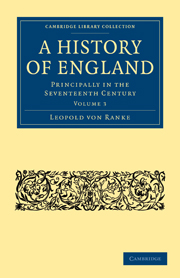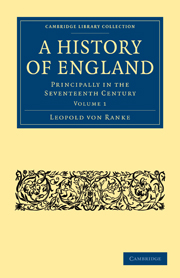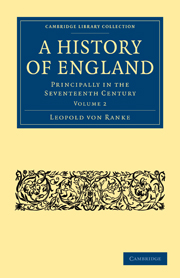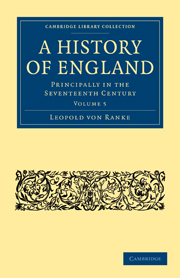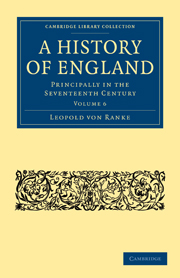A History of England
German historian Leopold von Ranke (1795–1886) is well known for pioneering the modern historical method which advocates empiricism, rather than a focus on the philosophy of history. Emphasizing the importance of presenting history exactly as it happened, Ranke asserted that different eras need to be understood in their own contexts rather than in relation to each other: history should not be regarded as one long, teleological narrative. These principles of writing history, established in earlier publications, are all evident here. Originally published in eight volumes between 1859 and 1869, Ranke's history, 'principally in the seventeenth century', was first published in English as a six-volume history by the Clarendon Press in 1875, the mammoth task of its translation distributed among eight Oxford dons. Volume 3 focuses on the Interregnum years, detailing the rise and fall of Oliver Cromwell's Protectorate, the Restoration, and Charles II's wars with the Dutch.
Product details
November 2010Paperback
9781108022118
608 pages
216 × 140 × 34 mm
0.76kg
Available
Table of Contents
- Book XI. The Commonwealth in England, 1649–1653:
- 1. Republican ideas and institutions in England. The Levellers
- 2. Rinuccini and Cromwell in Ireland
- 3. Charles II and Cromwell in Scotland
- 4. Growth of the power of the Commonwealth by land and sea
- 5. Dissolution of the Long Parliament
- 6. The Little Parliament
- Book XII. The Protectorate of Oliver Cromwell, 1653–1658:
- 1. Oliver Cromwell and his elevation to the Protectorate
- 2. Embassy to Sweden. Peace with Holland
- 3. The Parliament of 1654
- 4. Military government. Religious tolerance
- 5. Rupture with Spain
- 6. The Parliament of 1656, 1657. Idea of a Cromwellian monarchy
- 7. The general position of the Protectorate at home and abroad in 1657 and 1658
- 8. Death of Oliver Cromwell
- Book XIII. Fall of the Protectorate and the Commonwealth. Restoration of the Monarchy, 1658–1660: Introduction
- 1. Attempt to continue the Protectorate
- 2. Attempt to form a Commonwealth on a new basis
- 3. Royalist movements in the summer of 1659
- 4. Supremacy and constitutional projects of the army
- 5. Lambert and Monk. Restoration of the Rump Parliament
- 6. Anti-republic movement. Monk in the city
- 7. Recall of the king
- Book XIV. The First Five Years under Charles II. The Restoration of the Anglican Church:
- 1. The state of affairs at the Restoration
- 2. The Convention Parliament in the summer of 1660
- 3. Foreign policy. Marriages in the royal family
- 4. Religious differences. The Coronation. A new Parliament
- 5. The first two years of the Long Parliament of the Restoration. The Act of Uniformity
- 6. Relations with France. Sale of Dunkirk
- 7. A scheme for reunion with Rome. Claim to the dispensing power. Personal relations in court and state
- Book XV. The Dutch Wars of Charles II. Establishment of the Protestant and Parliamentary Character of the Constitution, 1664–1674: Introduction
- 1. The first war with Holland, in the year 1665
- 2. Influence of France upon the continuation of war and upon the peace
- 3. Fall of the Lord Chancellor Clarendon
- 4. Convention at the Hague in January 1668. Triple alliance
- 5. Government and parliament in the year 1668
- 6. Secret alliance with France, 1669, 1670
- 7. Parliamentary sessions from 1669 to 1671
- 8. The second war against Holland, 1672
- 9. Origin of the Test Act
- 10. Peace with Holland
- 11. Union of Parliament with the Prince of Orange
- 12. Movement in literature.

